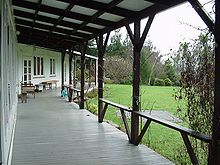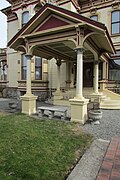veranda
A veranda is a half-open, roofed extension on country or residential houses , often resting on wooden posts, or a covered terrace , which protects the sides of the house from direct sunlight and on which you can stay in the fresh air even when it rains.
Verandas are mostly found in warmer areas, especially in Australia and the southern United States. In moderate latitudes, they can approximate a winter garden with windbreak walls and light panels .
etymology
The word veranda was borrowed from an Indian language (cf. Bengali bārāṇḍā and Hindi varaṇḍā ) into English in the 18th century and from there it was used in German and other European languages in the 19th century. However, since it was used very early in Portuguese (1498 at the latest) and Spanish texts, it is probably not originally an Indian word, but rather was brought to India by the Portuguese and Spanish East Indiamans of the 16th and 17th centuries and "reimported" by the later English colonial rulers to Europe. In this case, it ultimately goes back to the late Latin vāra "transverse wood, fork-shaped rod" or the gerundive of a (though not attested) verb * vārāre " close with rods" and means therefore actually "boundary, barrier."
Verandas and the like in the United States
Verandas and the like are much more common in residential architecture in the United States than in Central Europe. There one differentiates:
- Porch
- a covered area attached to the outer wall; Roof can be supported on pillars; intended for residence and often furnished with furniture; can be shielded by walls, fly screens or window panes so that they can be used all year round; the term is used more in the north of the United States
- veranda
- a covered area attached to the outside wall, often L-shaped or more complex built around the house; intended for residence and often furnished with furniture; often with railing; the transition between porch and veranda is fluid, but the term “veranda” is used more in the southern United States
- Portico
- a small, covered area in front of the front door ( portico ) , always supported by columns , which accentuates the entrance area and, especially in rainy weather, forms a transition area between inside and outside, but is not intended for staying
- Porte-cochère
- similar to Portico , but larger and not intended for pedestrians, but for people arriving by vehicle; more in front of side than main entrances
Web links
Individual evidence
- ↑ Sir Henry Yule : Veranda . In: William Crooke (ed.): Hobson-Jobson. A Glossary of Colloquial Anglo-Indian Words and Phrases, and of Kindred Terms, Etymological, Historical, Geographical and Discursive . J. Murray, London 1903, p. 965-967 ( dsalsrv02.uchicago.edu ).
- ↑ Veranda. In: Digital dictionary of the German language . Based on: Wolfgang Pfeifer: Etymological Dictionary of German. 2nd Edition. Akademie-Verlag, Berlin 1993.
- ↑ What are the differences between a Porch and Veranda, Gazebo and Pergola, Patio and Deck? Retrieved April 11, 2020 .







